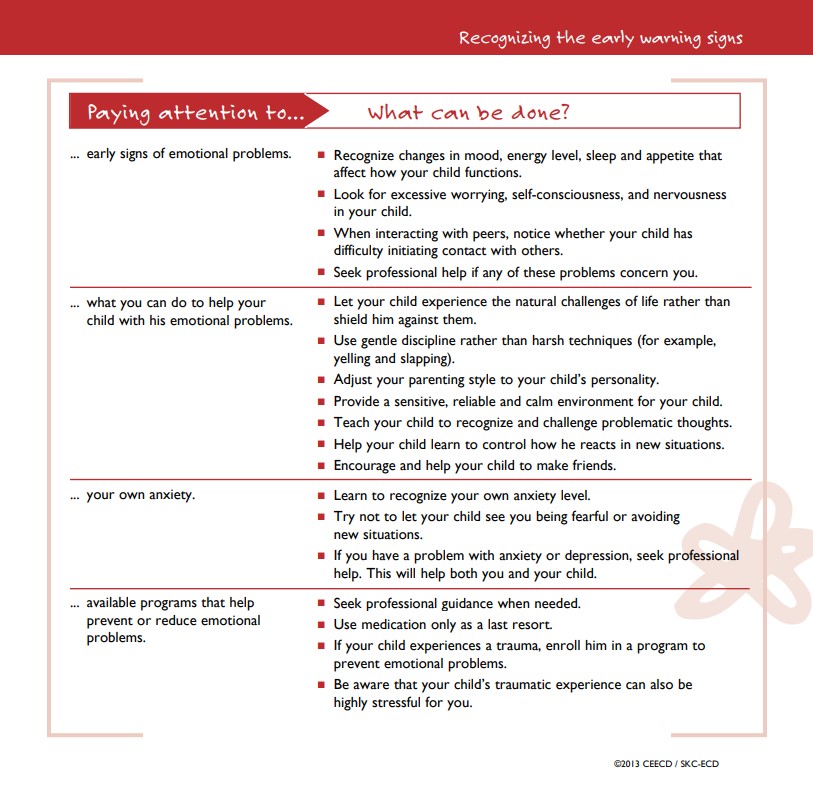 15 May 2017
15 May 2017
What do we know?
- It is normal for young children to sometimes feel afraid, shy or sad. However, for some children, these feelings last for a long time and can affect their development.
- Emotional problems like anxiety and depression often happen at the same time. Both can be described as feelings of inner emotional distress.
- It is more common for young children to have fears and anxieties than depression.
- It is hard to detect symptoms of anxiety and depression in young children (unlike aggression and hyperactivity). If anxiety and depression are not noticed and addressed in the early years, they can lead to mental health problems later in life. However, it is important to know that this only happens in a relatively small percent of children.
- The children who are most likely to have emotional problems later in life are those who are behaviourally inhibited.
- Toddlers and young children who are behaviourally inhibited appear very shy, tend to avoid social contacts and withdraw from unfamiliar situations.
- Children usually first show signs of emotional problems when around other children.
- Young children with anxiety and depression are often fearful, worried and nervous around other children. They rarely initiate contact and are at risk for being rejected or ignored by peers.
- However, a positive peer relationship, such as having a best friend, can help protect anxious and depressed children against the negative consequences of emotional problems.
- Children’s environment, including their parents’ behaviours, family conflicts and traumatic experiences, can also lead at risk children to develop anxiety and depression.
- Parents can help protect children from later emotional problems by showing supporting guidance, allowing children to explore their environment, and by providing warm, sensitive and consistent response and discipline.

Information
This information sheet is a publication of the Centre of Excellence for Early Childhood Development (CEECD) and the Strategic Knowledge Cluster on Early Child Development (SKC-ECD). These organizations identify and summarize the best scientific work on early childhood development. They disseminate this knowledge to a variety of audiences in formats and languages adapted to their needs.
For a more in-depth understanding of anxiety and depression, consult our synthesis and experts’ articles on this topic in the Encyclopedia on Early Childhood Development, available free of charge at www.child-encyclopedia.com.
Several organizations financially support the CEECD and the SKC-ECD, including the Social Sciences and Humanities Research Council of Canada, Université Laval, and private foundations. The views expressed herein do not necessarily represent the official policies of these organizations.
We are grateful to The Lawson Foundation and the Margaret & Wallace McCain Family Foundation for their financial contribution to produce this information sheet.
Centre of Excellence for Early Childhood Development
Strategic Knowledge Cluster on Early Child Development
Université de Montréal
3050, Édouard-Montpetit Blvd., GRIP
P.O. Box 6128, succursale Centre-ville
Montreal, Quebec H3C 3J7
Telephone: 514.343.6111, extension 2541
Fax: 514.343.6962
E-mail: cedje-ceecd@umontreal.ca
Websites: www.excellence-earlychildhood.ca and www.skc-ecd.ca
In this document, the masculine form is used merely to simplify the text. No discrimination is intended.

